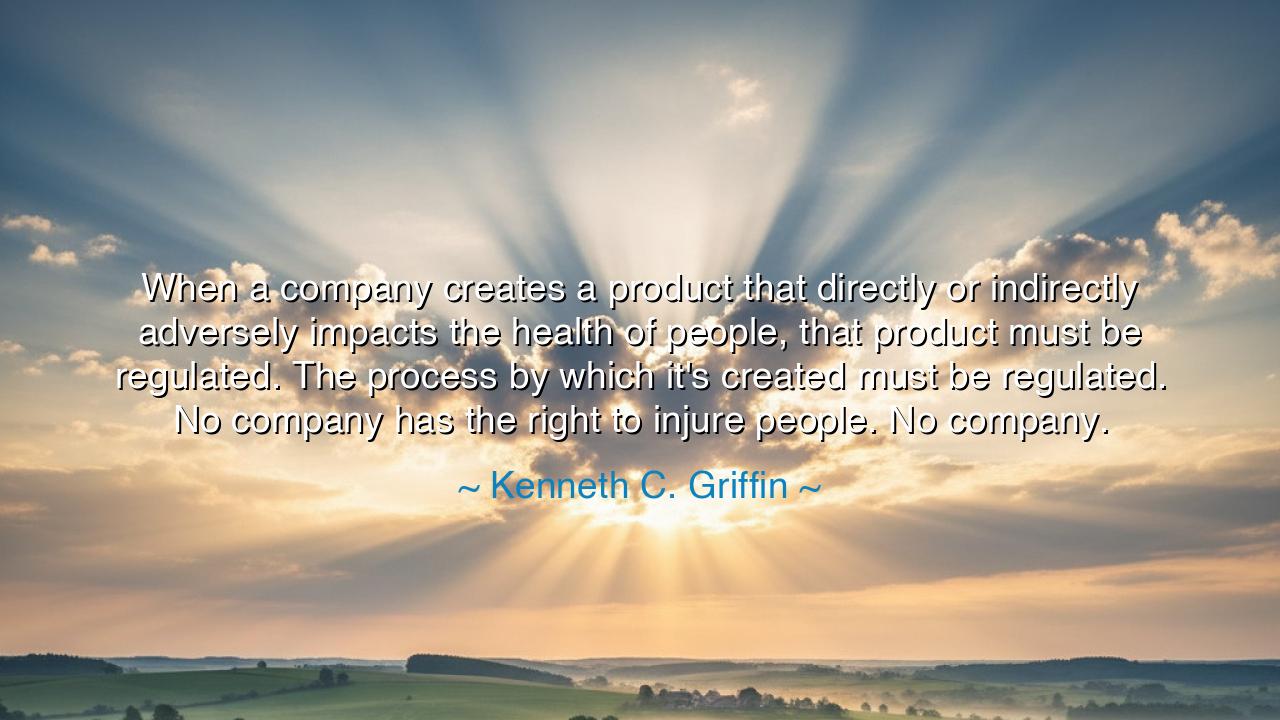
When a company creates a product that directly or indirectly
When a company creates a product that directly or indirectly adversely impacts the health of people, that product must be regulated. The process by which it's created must be regulated. No company has the right to injure people. No company.






The Law of Responsibility
Hear now the words of Kenneth C. Griffin, spoken not as the cry of an idealist, but as the command of conscience: “When a company creates a product that directly or indirectly adversely impacts the health of people, that product must be regulated. The process by which it's created must be regulated. No company has the right to injure people. No company.” These words ring with the authority of ancient justice, as though they were carved into stone for all generations to read. They remind humankind that power without accountability is a weapon, and that commerce, without morality, becomes corruption.
The Meaning of the Teaching
To understand this teaching is to see that wealth and innovation are not the highest virtues of civilization—human life is. A society may build towers of glass, engines of speed, and miracles of science, yet if those creations poison the breath of its people or shorten the years of its children, then such progress is false and hollow. Griffin’s words strike against the arrogance of unchecked industry, calling forth the ancient truth that prosperity must serve the people, not consume them. A company, like an individual, is bound by the moral law that says: Do no harm.
The Origin of the Words
Kenneth C. Griffin, a titan of modern finance, spoke from a place few reach—one of immense influence and insight into the engines of the global market. Yet even from such heights, he saw the peril of profit ungoverned by principle. His words echo a timeless realization: that civilization itself stands or falls on whether its powerful act with restraint and integrity. The marketplace is not a lawless battlefield; it is a living system that sustains the human body and spirit. To allow companies to create harm unchecked is to invite decay, both moral and physical, into the heart of society.
The Tale of Tragedy and Reckoning
Consider the story of the Cuyahoga River in the twentieth century—once a proud vein of life for the city of Cleveland, but darkened by the filth of unregulated industry. The river caught fire, not once but many times, so thick was the oil upon its surface. Factories had poured their waste freely, claiming the right to profit while denying their duty to protect. Only when flames lit the water and smoke rose into the conscience of the nation did the people demand regulation, leading to the birth of the Environmental Protection Agency and the Clean Water Act. Out of the fire was born understanding: that no enterprise, however mighty, has the right to injure life for gain.
The Balance Between Creation and Care
In every age, humanity wrestles with the same test—how to balance creation with compassion. The craftsman must ensure his work does not wound. The inventor must weigh his marvel against its consequence. The company must see not only profit margins but human faces. For unchecked ambition can become a devouring beast. Griffin’s teaching stands as a pillar of warning: that the hand which builds must also protect. The one who brings forth new things into the world must carry the burden of responsibility for their effects.
The Voice of the Ancients
The ancient sages would have called this justice—the balance that maintains the harmony of the world. In the old kingdoms, merchants who sold impure wares were punished, and builders who raised unsafe homes bore the guilt of collapse. They understood what many have forgotten: that wealth without virtue leads to ruin. When a company poisons rivers, sickens workers, or conceals the truth of harm, it commits not just a legal offense but a sin against the order of life. The moral universe demands restoration, and if it is not done willingly, nature and time will exact their due.
The Lesson for Our Age
So, my listener, take this wisdom into your heart: no one has the right to profit by another’s suffering. When you see harm masked as progress, speak. When you see greed clothed in the language of innovation, resist. Support those who build with care, who craft with conscience, who measure success not in gold but in the health of their community. For every act of regulation is not a barrier to freedom—it is a shield that guards the innocent from the reckless.
The Call to Stewardship
Let this truth echo through the generations: the pursuit of prosperity must never outrun the protection of life. If you lead a company, lead with conscience. If you invent, invent with foresight. If you govern, govern with justice. The earth is not a market; it is a home. Humanity is not a workforce; it is a family. The wealth of the future will not be counted in dollars, but in clean air, safe water, and thriving souls. And so Griffin’s words stand as both warning and hope—a summons to all who hold power: Do not injure the world you serve, for in wounding it, you wound yourself.






AAdministratorAdministrator
Welcome, honored guests. Please leave a comment, we will respond soon